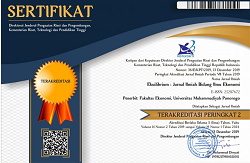Social Media Networking and Knowledge Sharing in Increasing Innovation and MSME’s Growth: Based on the Theory of Communication Visibility
DOI: 10.24269/ekuilibrium.v17i2.2022.pp122-138
Abstract
The purpose of this study is to examine the direct effect of social media networking, knowledge sharing, and innovation on MSME's growth. This study also examines the role of knowledge sharing and innovation in mediating the influence of social media networking on the MSME’s growth. This research is survey research. Respondents are MSMEs from young entrepreneurs assisted by universities. Respondents who participated in this study were 467 people, but only 421 could be used. Data analysis techniques in this study using PLS-SEM. The results show that social media networking, knowledge sharing, and innovation affect MSME's growth. Knowledge sharing and innovation play a part in mediating the influence of social media networking on MSME’s growth. This study examines the role of knowledge sharing and innovation in mediating social media networking on MSME’s growth.
Keywords
References
- Ahmad, S. Z. (2014). Small and medium enterprises’ internationalisation and business strategy: Some evidence from firms located in an emerging market. Journal of Asia Business Studies, 8(2), 168–186. https://doi.org/10.1108/JABS-03-2013-0012
- Ainin, S., Parveen, F., Moghavvemi, S., Jaafar, N. I., & Mohd Shuib, N. L. (2015). Factors influencing the use of social media by SMEs and its performance outcomes. Industrial Management & Data Systems, 115(3), 570–588. https://doi.org/10.1108/IMDS-07-2014-0205
- Ainin, S., Parveen, F., Moghavvemi, S., Jaafar, N. I., & Shuib, N. L. M. (2015). Factors influencing the use of social media by SMEs and its performance outcomes. Industrial Management and Data Systems, 115(3), 570–588. https://doi.org/10.1108/IMDS-07-2014-0205
- AlSharji, A., Ahmad, S. Z., & Abu Bakar, A. R. (2018). Understanding social media adoption in SMEs: Empirical evidence from the United Arab Emirates. Journal of Entrepreneurship in Emerging Economies, 10(2), 302–328. https://doi.org/10.1108/JEEE-08-2017-0058
- Campbell, D. A., Lambright, K. T., & Wells, C. J. (2014). Looking for friends, fans, and followers? Social media use in public and nonprofit human services. Public Administration Review, 74(5). https://doi.org/10.1111/puar.12261
- Carcary, M., Doherty, E., & Conway, G. (2016). A dynamic capability approach to digital transformation: a focus on key foundational themes. In the European Conference on Information Systems Management. Academic Conferences International Limited.
- Castaneda, D. I., & Cuellar, S. (2020). Knowledge sharing and innovation: A systematic review. Knowledge and Process Management, 27(3), 159–173. https://doi.org/10.1002/kpm.1637
- Cervellon, M. C., & Galipienzo, D. (2015). Facebook Pages Content, does it Really Matter? Consumers’ Responses to Luxury Hotel Posts with Emotional and Informational Content. Journal of Travel and Tourism Marketing, 32(4), 428–437. https://doi.org/10.1080/10548408.2014.904260
- Crammond, R., Omeihe, K. O., Murray, A., & Ledger, K. (2018). Managing knowledge through social media: Modelling an entrepreneurial approach for Scottish SMEs and beyond. Baltic Journal of Management, 13(3), 303–328. https://doi.org/10.1108/BJM-05-2017-0133
- Desrtriyanto, P. A. E., Setiawan, F., Purwaningrum, T., Muhammadiyah Ponorogo, U., & Budi Utomo Nomor, J. (2022). The Role of Electronic Worth of Mouth in Mediating Tiktok Social Media Toward the Organizational Image Of Universitas Muhammadiyah Ponorogo. Jurnal Ilmiah Bidang Ilmu Ekonomi, 17(1), 14–22. http://journal.umpo.ac.id/index.php/ekuilibrium
- Dwi Amalia, A., & Citra Melati, F. (2021). Analysis of MSMEs Recovery using Digital Technology in the Covid-19 Pandemic Era. Jurnal Ilmiah Bidang Ilmu Ekonomi, 16(2), 117–128. http://journal.umpo.ac.id/index.php/ekuilibrium
- Ebrahimi, B. (2019). Efficiency measurement to identify the best efficient unit in the presence of dual-role factors. International Journal of Applied Decision Sciences, 13(1), 93–108. https://doi.org/10.1504/ijads.2020.10020424
- Ebrahimi, P., Ahmadi, M., Gholampour, A., & Alipour, H. (2019). CRM performance and development of media entrepreneurship in digital, social media and mobile commerce. International Journal of Emerging Markets, 16(1), 25–50. https://doi.org/10.1108/IJOEM-11-2018-0588
- Eidizadeh, R., Salehzadeh, R., & Chitsaz Esfahani, A. (2017). Analysing the role of business intelligence, knowledge sharing and organisational innovation on gaining competitive advantage. Journal of Workplace Learning, 29(4), 250–267. https://doi.org/10.1108/jwl-07-2016-0070
- Engelbrecht, A., Gerlach, J. P., Benlian, A., & Buxmann, P. (2019). How employees gain meta-knowledge using enterprise social networks: A validation and extension of communication visibility theory. Journal of Strategic Information Systems, 28(3), 292–309. https://doi.org/10.1016/j.jsis.2019.04.001
- Gronum, S., Verreynne, M. L., & Kastelle, T. (2012). The Role of Networks in Small and Medium-Sized Enterprise Innovation and Firm Performance. Journal of Small Business Management, 50(2), 257–282. https://doi.org/10.1111/j.1540-627X.2012.00353.x
- Gubbins, C., & Dooley, L. (2014). Exploring Social Network Dynamics Driving Knowledge Management for Innovation. Journal of Management Inquiry, 23(2), 162–185. https://doi.org/10.1177/1056492613499203
- Gupta, R., & Pandit, A. (2013). Innovation and growth of small and medium enterprises: Role of environmental dynamism and firm resources as moderating variables. International Journal of Entrepreneurship and Innovation Management, 17(4–6), 284–295. https://doi.org/10.1504/IJEIM.2013.059888
- Harms, R., Reschke, C. H., Kraus, S., & Fink, M. (2010a). Antecedents of innovation and growth: Analysing the impact of entrepreneurial orientation and goal-oriented management. International Journal of Technology Management, 52(1–2), 135–152. https://doi.org/10.1504/IJTM.2010.035859
- Harms, R., Reschke, C. H., Kraus, S., & Fink, M. (2010b). Antecedents of innovation and growth: Analysing the impact of entrepreneurial orientation and goal-oriented management. International Journal of Technology Management, 52(1–2), 135–152. https://doi.org/10.1504/IJTM.2010.035859
- Hartono, R., & Sheng, M. L. (2016). Technology Analysis & Strategic Management Knowledge sharing and firm performance: the role of social networking site and innovation capability. 7325(January). https://doi.org/10.1080/09537325.2015.1095289
- Hendriks, P. (1999). Why share knowledge? The influence of ICT on the motivation for knowledge sharing. Knowledge and Process Management, 6(2). https://doi.org/10.1002/(sici)1099-1441(199906)6:2<91:aid-kpm54>3.0.co;2-m
- Huang, L., Li, Y., Huang, X., & Zhou, L. (2021). How social distance affects the intention and behavior of collaborative consumption: A study based on online car-hailing service. Journal of Retailing and Consumer Services, 61. https://doi.org/10.1016/j.jretconser.2021.102534
- Hung, S. W., Cheng, M. J., Hou, C. E., & Chen, N. R. (2021). Inclusion in global virtual teams: Exploring non-spatial proximity and knowledge sharing on innovation. Journal of Business Research, 128(November 2018), 599–610. https://doi.org/10.1016/j.jbusres.2020.11.022
- Hutchings, C. (2012). Commercial use of Facebook and Twitter - Risks and rewards. Computer Fraud and Security, 2012(6). https://doi.org/10.1016/S1361-3723(12)70065-9
- Ipe, M. (2003). Knowledge Sharing in Organizations: A Conceptual Framework. Human Resource Development Review, 2(4). https://doi.org/10.1177/1534484303257985
- Komppula, R., & Reijonen, H. (2006). Performance Determinants in Small and M i c r o Tourism BusinessKomppula, R., & Reijonen, H. (2006). Performance Determinants in Small and M i c r o Tourism Business. Tourism Review, 61(4), 13–20. Tourism Review, 61(4), 13–20.
- Kwahk, K., & Park, D. (2016). Computers in Human Behavior The effects of network sharing on knowledge-sharing activities and job performance in enterprise social media environments. Computers in Human Behavior, 55, 826–839. https://doi.org/10.1016/j.chb.2015.09.044
- Kwayu, S., Abubakre, M., & Lal, B. (2021a). The influence of informal social media practices on knowledge sharing and work processes within organizations. International Journal of Information Management, 58(December 2019), 102280. https://doi.org/10.1016/j.ijinfomgt.2020.102280
- Kwayu, S., Abubakre, M., & Lal, B. (2021b). The influence of informal social media practices on knowledge sharing and work processes within organizations. International Journal of Information Management, 58(December 2020), 102280. https://doi.org/10.1016/j.ijinfomgt.2020.102280
- Kwayu, S., Abubakre, M., & Lal, B. (2021c). The influence of informal social media practices on knowledge sharing and work processes within organizations. International Journal of Information Management, 58(December 2020), 102280. https://doi.org/10.1016/j.ijinfomgt.2020.102280
- Leonardi, P. M. (2014). Social media, knowledge sharing, and innovation: Toward a theory of communication visibility. Information Systems Research, 25(4), 796–816. https://doi.org/10.1287/isre.2014.0536
- Macpherson, A., & Holt, R. (2007). Knowledge, learning and small firm growth: A systematic review of the evidence. Research Policy, 36(2), 172–192. https://doi.org/10.1016/j.respol.2006.10.001
- Mirzaee, S., & Ghaffari, A. (2018). Investigating the impact of information systems on knowledge sharing. Journal of Knowledge Management, 22(3), 501–520. https://doi.org/10.1108/JKM-08-2017-0371
- Muntinga, D. G., Moorman, M., & Smit, E. G. (2011). Introducing COBRAs: Exploring motivations for Brand-Related social media use. International Journal of Advertising, 30(1). https://doi.org/10.2501/IJA-30-1-013-046
- Odoom, R., Anning-Dorson, T., & Acheampong, G. (2017). Antecedents of social media usage and performance benefits in small- and medium-sized enterprises (SMEs). Journal of Enterprise Information Management, 30(3), 383–399. https://doi.org/10.1108/JEIM-04-2016-0088
- OECD. (2019). Southeast Asia Going Digital: Connecting SMEs. Oecd, September, 1–158. https://www.oecd.org/going-digital/southeast-asia-connecting-SMEs.pdf
- Ongori, H., & Migiro, S. O. (2010). Information and communication technologies adoption in SMEs: literature review. Journal of Chinese Entrepreneurship, 2(1), 93–104. https://doi.org/10.1108/17561391011019041
- Oyewobi, L. O., Adedayo, O. F., Olorunyomi, S. O., & Jimoh, R. (2021a). Social media adoption and business performance: the mediating role of organizational learning capability (OLC). Journal of Facilities Management, 19(4), 413–436. https://doi.org/10.1108/JFM-12-2020-0099
- Oyewobi, L. O., Adedayo, O. F., Olorunyomi, S. O., & Jimoh, R. (2021b). Social media adoption and business performance: the mediating role of organizational learning capability (OLC). Journal of Facilities Management, 19(4), 413–436. https://doi.org/10.1108/JFM-12-2020-0099
- Oyewobi, L. O., Olorunyomi, O. S., Jimoh, R. A., & Rotimi, J. O. B. (2020a). Impact of social media usage on performance of construction businesses (CBs) in Abuja, Nigeria. Journal of Financial Management of Property and Construction, 26(2), 257–278. https://doi.org/10.1108/JFMPC-05-2020-0042
- Oyewobi, L. O., Olorunyomi, O. S., Jimoh, R. A., & Rotimi, J. O. B. (2020b). Impact of social media usage on performance of construction businesses (CBs) in Abuja, Nigeria. Journal of Financial Management of Property and Construction, 26(2), 257–278. https://doi.org/10.1108/JFMPC-05-2020-0042
- Palacios-Marqués, D., Merigó, J. M., & Soto-Acosta, P. (2015). Online social networks as an enabler of innovation in organizations. Management Decision, 53(9), 1906–1920. https://doi.org/10.1108/MD-06-2014-0406
- Palacios-Marqués, D., Popa, S., & Pilar Alguacil Mari, M. (2016a). The effect of online social networks and competency-based management on innovation capability. Journal of Knowledge Management, 20(3), 499–511. https://doi.org/10.1108/JKM-05-2015-0175
- Palacios-Marqués, D., Popa, S., & Pilar Alguacil Mari, M. (2016b). The effect of online social networks and competency-based management on innovation capability. Journal of Knowledge Management, 20(3), 499–511. https://doi.org/10.1108/JKM-05-2015-0175
- Palacios-Marqués, D., Soto-Acosta, P., & Merigó, J. M. (2015). Analyzing the effects of technological, organizational and competition factors on Web knowledge exchange in SMEs. Telematics and Informatics, 32(1), 23–32. https://doi.org/10.1016/j.tele.2014.08.003
- Papa, A., Santoro, G., Tirabeni, L., & Monge, F. (2018). Social media as tool for facilitating knowledge creation and innovation in small and medium enterprises. Baltic Journal of Management, 13(3), 329–344. https://doi.org/10.1108/BJM-04-2017-0125
- Parveen, F., Jaafar, N. I., & Ainin, S. (2015). Social media usage and organizational performance: Reflections of Malaysian social media managers. Telematics and Informatics, 32(1), 67–78. https://doi.org/10.1016/j.tele.2014.03.001
- Perry-Smith, J. E., & Niversity, E. U. (2017). From Creativity to Innovation: The Social Network Drivers of The Four Phases of The Idea Journey. Academy of Management Review, 42(1), 53–79. http://dx.doi.org/!0.5465/amr.2014.0462
- Pratono, A. H. (2018a). From social network to firm performance: The mediating effect of trust, selling capability and pricing capability. Management Research Review, 41(6), 680–700. https://doi.org/10.1108/MRR-03-2017-0080
- Pratono, A. H. (2018b). From social network to firm performance: The mediating effect of trust, selling capability and pricing capability. Management Research Review, 41(6), 680–700. https://doi.org/10.1108/MRR-03-2017-0080
- Quinton, S., & Wilson, D. (2016). Tensions and ties in social media networks: Towards a model of understanding business relationship development and business performance enhancement through the use of LinkedIn. Industrial Marketing Management, 54. https://doi.org/10.1016/j.indmarman.2015.12.001
- Rafi, N., Ahmed, A., Shafique, I., & Kalyar, M. N. (2021). Knowledge management capabilities and organizational agility as liaisons of business performance. South Asian Journal of Business Studies. https://doi.org/10.1108/SAJBS-05-2020-0145
- Rahimnia, F., & Hassanzadeh, J. F. (2013). The impact of website content dimension and e-trust on e-marketing effectiveness: The case of Iranian commercial saffron corporations. Information and Management, 50(5), 240–247. https://doi.org/10.1016/j.im.2013.04.003
- Ratasuk, A., & Charoensukmongkol, P. (2020). Does cultural intelligence promote cross-cultural teams’ knowledge sharing and innovation in the restaurant business? Asia-Pacific Journal of Business Administration, 12(2), 183–203. https://doi.org/10.1108/APJBA-05-2019-0109
- Ritala, P., Olander, H., Michailova, S., & Husted, K. (2015). Knowledge sharing, knowledge leaking and relative innovation performance: An empirical study. Technovation, 35, 22–31. https://doi.org/10.1016/j.technovation.2014.07.011
- Roberts, D. L., Piller, F. T., & Lüttgens, D. (2016). Mapping the Impact of Social Media for Innovation: The Role of Social Media in Explaining Innovation Performance in the PDMA Comparative Performance Assessment Study. Journal of Product Innovation Management, 33, 117–135. https://doi.org/10.1111/jpim.12341
- Salojärvi, S., Furu, P., & Sveiby, K. E. (2005). Knowledge management and growth in Finnish SMEs. Journal of Knowledge Management, 9(2), 103–122. https://doi.org/10.1108/13673270510590254
- Scuotto, V., del Giudice, M., & Carayannis, E. G. (2017a). The effect of social networking sites and absorptive capacity on SMES’ innovation performance. Journal of Technology Transfer, 42(2), 409–424. https://doi.org/10.1007/s10961-016-9517-0
- Scuotto, V., del Giudice, M., & Carayannis, E. G. (2017b). The effect of social networking sites and absorptive capacity on SMES’ innovation performance. Journal of Technology Transfer, 42(2), 409–424. https://doi.org/10.1007/s10961-016-9517-0
- Soto-Acosta, P., Popa, S., & Palacios-Marqués, D. (2016). E-business, organizational innovation and firm performance in manufacturing SMEs: an empirical study in Spain. Technological and Economic Development of Economy, 22(6), 885–904. https://doi.org/10.3846/20294913.2015.1074126
- Staw, B. M. (1991). Dressing Up Like an Organization: When Psychological Theories Can Explain Organizational Action. Journal of Management, 17(4). https://doi.org/10.1177/014920639101700412
- Tajvidi, R., & Karami, A. (2021a). The effect of social media on firm performance. Computers in Human Behavior, 115, 105174. https://doi.org/10.1016/j.chb.2017.09.026
- Tajvidi, R., & Karami, A. (2021b). The effect of social media on firm performance. Computers in Human Behavior, 115, 105174. https://doi.org/10.1016/j.chb.2017.09.026
- Tiwasing, P. (2021). Social media business networks and SME performance: A rural–urban comparative analysis. Growth and Change, 52(3), 1892–1913. https://doi.org/10.1111/grow.12501
- van den Hooff, B., & Ridder, J. A. (2004). Knowledge sharing in context: The influence of organizational commitment, communication climate and CMC use on knowledge sharing. Journal of Knowledge Management, 8(6). https://doi.org/10.1108/13673270410567675
- Wang, Z., & Wang, N. (2012a). Knowledge sharing, innovation and firm performance. Expert Systems with Applications, 39(10), 8899–8908. https://doi.org/10.1016/j.eswa.2012.02.017
- Wang, Z., & Wang, N. (2012b). Knowledge sharing, innovation and firm performance. Expert Systems with Applications, 39(10), 8899–8908. https://doi.org/10.1016/j.eswa.2012.02.017
- Yang, X., Ye, H. (Jonathan), & Wang, X. (2021). Social media use and work efficiency: Insights from the theory of communication visibility. Information and Management, 58(4). https://doi.org/10.1016/j.im.2021.103462
- Zhang, X., Gao, Y., Yan, X., de Pablos, P. O., Sun, Y., & Cao, X. (2015). From e-learning to social-learning: Mapping development of studies on social media-supported knowledge management. Computers in Human Behavior, 51, 803–811. https://doi.org/10.1016/j.chb.2014.11.084
Refbacks
- There are currently no refbacks.

This work is licensed under a Creative Commons Attribution-ShareAlike 4.0 International License.













